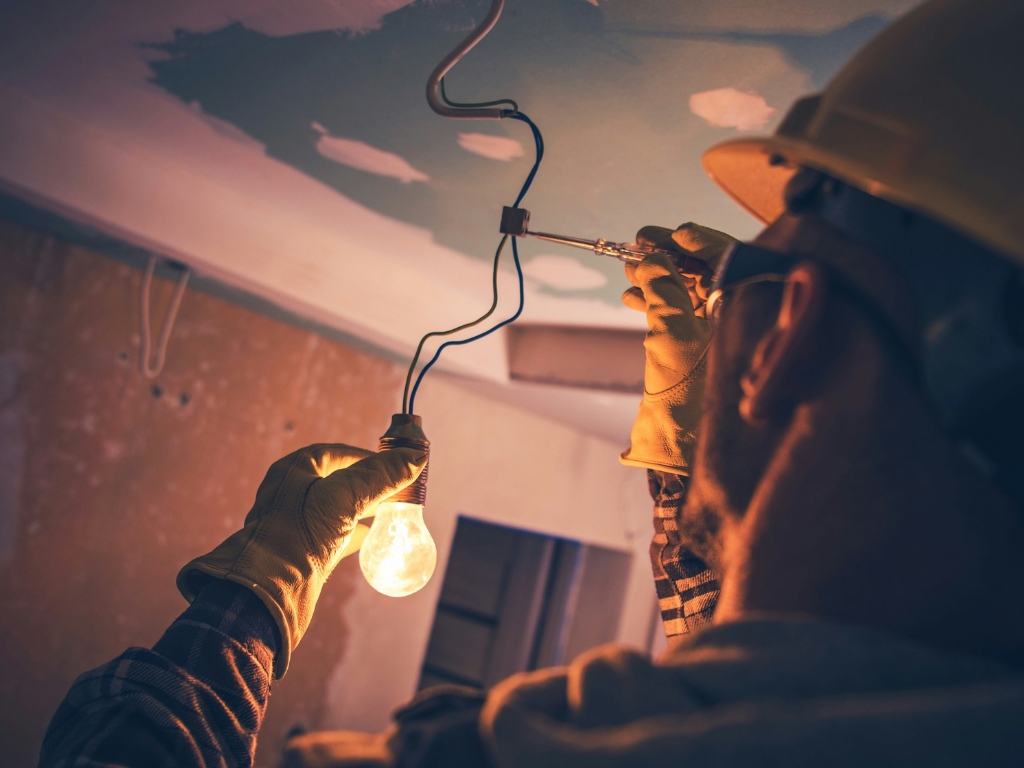You know that feeling when your house starts doing strange things? The lights flicker when you turn on the microwave, or you hear weird buzzing sounds from the walls. Most people just ignore these signs and hope they go away, but your house might be trying to tell you something important about its electrical system.
Those Flickering Lights Aren’t Just Annoying
Flickering lights are probably the most common electrical warning sign that homeowners notice. Sure, sometimes it happens when a big appliance kicks on, and that’s usually normal. But if your lights are constantly flickering or dimming without any obvious reason, there’s probably something going on behind the scenes.
The problem could be as simple as a loose light bulb or as serious as faulty wiring. Old homes especially tend to have this issue because their electrical systems weren’t designed to handle all the gadgets and appliances we use today. When the wiring can’t keep up with the demand, lights start to flicker as the electrical current struggles to reach everything that needs power.
Sometimes the flickering happens in just one room, which usually means the problem is with that specific circuit. Other times, it affects the whole house, and that typically points to an issue with the main electrical panel or the connection from the power company.
Strange Sounds Your House Makes
Houses make all sorts of noises, but electrical problems create their own special soundtrack. Buzzing, crackling, or sizzling sounds coming from outlets, switches, or the electrical panel are definitely not normal. These sounds often mean that electricity is arcing somewhere it shouldn’t be, which can be dangerous.
The buzzing sound is particularly concerning because it usually indicates loose connections or damaged wiring. When electrical connections get loose, they create resistance, which makes heat and that characteristic buzzing noise. This situation can eventually lead to fires if it’s not fixed.
For homeowners in New Zealand dealing with these concerning electrical sounds, getting professional help is essential. Companies such as Hall Electrical Services in Auckland can properly diagnose and fix these issues before they become serious safety hazards.
Crackling or popping sounds from outlets or switches are also red flags. These noises often happen when there’s moisture in the electrical system or when wires are damaged and creating small sparks.
When Outlets Get Hot or Spark
Outlets should never feel warm or hot to the touch. If you notice heat coming from an outlet, especially one that’s not even being used, that’s a clear sign something is wrong. Hot outlets usually mean there’s too much electrical current flowing through the wiring, or the connections inside the outlet are loose.
Sparking outlets are another obvious warning sign. While tiny sparks when you plug something in can be normal, large sparks or sparks that happen when nothing is being plugged in are definitely problematic. These sparks can ignite nearby materials and cause fires.
Sometimes outlets stop working altogether, which might seem less scary than sparking or heat, but it’s still worth investigating. Dead outlets often indicate problems with the circuit breaker, GFCI protection, or the wiring itself.
The Smell of Burning
One of the most serious electrical warning signs is the smell of something burning when there’s no obvious source. This odor often comes from overheated wiring, damaged insulation, or electrical components that are failing.
The smell might be subtle at first, almost metallic or plasticky. But as the problem gets worse, the burning smell becomes more obvious. This is not something to ignore or hope goes away on its own. Electrical fires can start inside walls where you can’t see them, and by the time you notice visible signs, it might be too late.
Circuit Breakers That Keep Tripping
Circuit breakers are designed to trip when there’s too much electrical current flowing through a circuit. It’s their job to protect your home from electrical overloads. But if the same breaker keeps tripping repeatedly, there’s usually an underlying problem.
Sometimes people think they can solve this by repeatedly resetting the breaker or even replacing it with a higher-rated one. This is actually dangerous because the breaker is trying to protect the wiring from more current than it can safely handle.
Frequent tripping can happen when too many appliances are plugged into the same circuit, when there’s a short circuit somewhere in the wiring, or when an appliance is drawing more power than it should.
Taking Action When Things Get Weird
The most important thing to remember about electrical warning signs is that they rarely fix themselves. Electrical problems tend to get worse over time, not better. While some electrical work might seem simple enough to handle yourself, most of these warning signs indicate issues that need professional attention.
Electrical work can be dangerous, and mistakes can be costly or even deadly. Professional electricians have the training and tools to safely diagnose problems and make proper repairs. They also know local electrical codes and can ensure that any work meets safety standards.
When your house starts acting weird with electrical issues, the smart move is to pay attention to what it’s trying to tell you. Those flickering lights, strange sounds, and burning smells are your home’s way of asking for help. Getting problems checked out early can prevent more serious issues down the road and keep your family safe.




